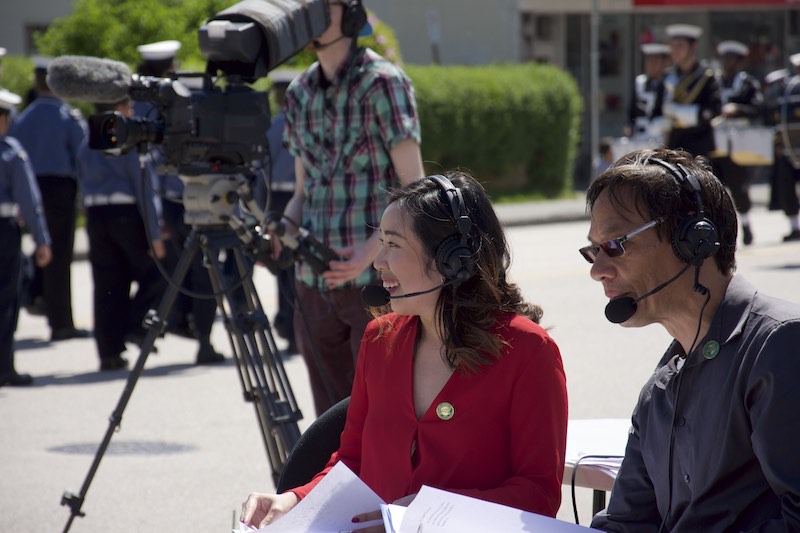I love being on camera: It terrifies and excites me at the same time. It has been something that I’ve loved ever since I was a little girl and I’m so grateful to be able to do what I love on a regular basis. Before each segment, I always search for tips on how to be comfortable on camera:
One of the most frequent questions I get asked on Instagram is on tips to being more comfortable and prepared on camera. I film videos for my YouTube channel, and have reported on Live Television Broadcasts as well as Taped segments for several Vancouver News channels. As of recently, I’ve also added Red Carpet Fashion Segments to my Media Kit!
How you can prepare yourself mentally and emotionally for TV is vastly different than for YouTube and in this post, I’ll be sharing my Tips and Tricks for getting comfortable to be on camera:
You would more than likely play one of two roles on TV– Interviewer or Interviewee
On-Camera Tips if you are reporting or interviewing:

Find your Sound
A key aspect of preparation is by watching other reporters to help you find your unique sound.
Are you funny, spunky, serious?
I found that by watching other reporters in fields of my interest and then by doing some introspective searching of my own has helped tremendously. Once you find your sound, it helps to set the stage for how you run your segments.
Preparation is KEY, but leave room for improvisation
I’ve always made it a point to learn everything that I can about who I’m interviewing or about the event that I’m reporting on.
Google searches and social media are amazing resources for stalking and if possible, watch previous interviews or segments on the events or individual so you get an idea of how they sound, act and more importantly, how much they talk on camera.
In my experience, things NEVER go exactly as planned. I like to treat the interviews I do as a conversation and as many conversations go, there is a tendency that it will shift in a different direction than initially expected and that’s great, as long as you prepare yourself to adapt to that shift.
Pre-camera chatter calms the nerves
Engage in small talk prior to cameras rolling! Heck, talk about what you’re about to talk about but in a casual manner. I find that this helps to calm the nerves (especially if you succeed in making them laugh) and it also preps their minds to answer the questions when the camera starts rolling!
I did that when I was filming my segment on winter skincare tips and you can watch how it went HERE!
Speak from the diaphragm
When you speak via your diaphragm, your voice is stronger, clearer and you are able to reduce gasping for air.
Look at yourself in the mirror and watch if your shoulders move up and down when you breathe. (it’s not supposed to)
Place a hand on your stomach and try to breathe by expanding your stomach and not your chest. As you get more accustomed to this, you can try speaking or singing using diaphragm breathing.
On-camera tips if you are being interviewed:
Visualization is power
One practice I always do is to visualize the set, the camera, where I might be sitting/or standing, and how I picture the segment to go. Have you heard the story of a basketball pro visualizing how he’s going to make that slam dunk? Yes, same theory.
When you visualize the many scenarios that might occur, it helps to prepare your mind for whatever might happen on set.
A fun tip: Visualizing yourself making a mistake on camera is also a key practice to prepare yourself for if it actually happens. AND, even if you do make a mistake, don’t worry too much about it. It’s all part of learning, and it’s important to take care of your mental health!
Prepare but not memorize
The difference between interviewing and being interviewed is that you need to be aware of the host’s efforts to either halt or expand on your points during the segment. Being able to recognize subtle social cues during a live segment is something that gets sharpened with more practice.
I try to practice a couple of times a few days prior to the segment, and then practice a few times out loud while visualizing the day before and one last time right before the segment.
When it’s a live segment, it’s not unusual for changes to occur right before going live and so if you have a brief idea of what you’re going to say, that would be better than having a script memorized. In other words, prepare to go with the flow!
Always watch yourself
It’s a really awkward and uncomfortable experience at first but it’s a key practice if you want to pick out things you can improve on. Things such as pronunciation, tone of voice and body gestures are some of them. Always watch yourself in a constructive manner for improvement. Make notes so that you can implement those changes the next time and see if you improve! Remember:
Positivity is KEY when you audit yourself. I share more about Positivity in your Mindset HERE!

What NOT to do on Camera:
Apologize repeatedly during a mistake
Most of the time the viewers don’t notice your mistake. So, if you must apologize due to a factual error, do so once and then move on!
- Don’t turn down an opportunity because of FEAR
It honestly doesn’t matter if you’ve never been on camera! Don’t let fear be something to take you away from an exciting opportunity. For a lot of the segments that I’ve been on, I haven’t always felt 100% prepared. That said, instead of feeling doubt, think of it as a challenge!
But never let an opportunity go because of fear.
I didn’t gather this information by learning it in school, in fact I never went to broadcasting school. That said, these are from my personal experiences in the industry so I hope it helps you too!
I’m planning on another piece on ‘What Clothing Best Suits Television’ as well as a YouTube Version! Let me know what you think of the post and I would love to know in the comments below 🙂
Adorable as always.
Love
Rossa | Beach Outfit Ideas With Set Styles